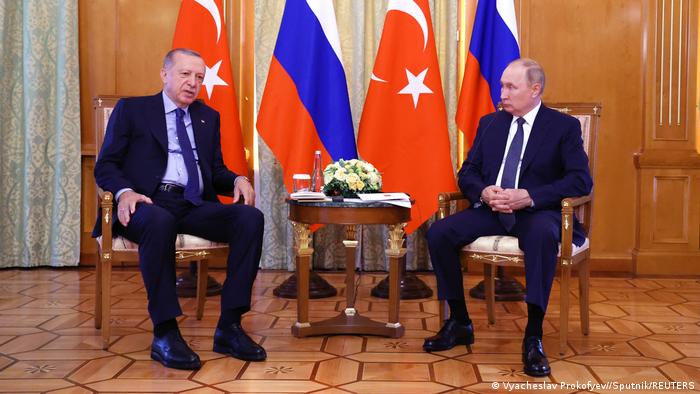Executive Summary
On 5 August, President Recep Tayyip Erdogan met Russian counterpart Vladimir Putin in Sochi, Russia. The closed-door, face-to-face meeting reportedly lasted more than four hours and came less than a month after the two leaders met in Iran during a trilateral summit focusing on the Astana peace process.
Overshadowed by economic considerations and discussions over the grain export agreement signed in July, Erdogan failed in his assessed attempt to obtain Russian approval for a security operation in northern Syria. Instead, Moscow appears to promote dialogue with the Syrian government to alleviate Turkey’s security concerns. Possibly relatedly, an uptick in Turkish operations targeting SDF in the Hasakah government was observed after the meeting.
As widely expected, the meeting on 5 August between President Putin and Erdogan predominantly focused on energy and economic cooperation between the two countries, as well as the implementation of the grain export agreement brokered by Turkey and the UN last month. In a joint press conference, both sides emphasized the necessity of “complete fulfillment of the package deal” reached between Ukraine and Russia, which paved the way for Ukraine to export 22 million tons of agricultural products as well as Russian exports of grain and fertilizers. President Putin also praised Turkey’s role in ensuring the continued import of Russian gas – which currently accounts for approximately 45% of Turkey’s energy needs – into Europe.
Both sides also made vague promises to expand economic cooperation, despite western sanctions on Russia, with Erdogan notably pledging to switch parts of its payments for Russian gas imports to rubles. Erdogan also said Turkey made ‘serious’ progress on adopting Mir – a Russian payment system designed to circumvent international sanctions since Mastercard and Visa halted services in the country.
Discussion in Syria marked by disagreements
Although overshadowed by economic considerations and the grain export agreement, the meeting also discussed the situation in Syria and was widely seen in advance as another Turkish attempt to obtain approval (or at least limit Russian resistance) to another Turkish military operation into YPG-controlled areas. To recall, the issue was extensively discussed during the trilateral meeting between Iran, Turkey, and Russia in July and despite Erdogan’s repeated pledge that Turkey will “not ask for permission”, recent diplomatic interactions clearly underscore Turkey’s intent to limit the diplomatic fallout in the event of another operation.
While not explicitly documented, Putin reportedly made clear his opposition to a large-scale Turkish intervention, warning alongside his Iranian counterparts that such a move would have a destabilizing effect on the region as a whole. Despite Putin’s intransigence, reports preceding the 5 August meeting speculated that Erdogan would again discuss the operation, including more detailed plans for an incursion into Manbij and Tal Rifaat – two cities controlled by YPG but located adjacent to areas controlled by Russian-backed Syrian government forces.
The meeting on 5 August appears – yet again – to have fallen short of Erdogan’s objectives for a Russian ‘approval’, with the rhetoric surrounding the visit implying that disagreements remain. Speaking ahead of the meeting, Kremlin spokesperson Dmitriy Peskov emphasized the importance of avoiding activities that may “jeopardize Syria’s territorial integrity while Putin stressed that both sides discussed ways to contribute to “normalization” in the country. In contrast, Erdogan stressed the importance of Russia-Turkey cooperation to fight “terrorism” and expressed the belief that the issue needs “more focus”. In remarks made after leaving Sochi, Erdogan said that the subject of an impending operation was discussed and that both sides “agreed” to Turkey’s right to “respond to attacks on its security forces and civilians,” however such rhetoric has not been reciprocated by Russian officials.
Moscow facilitates Syria-Turkey dialogue
For now, efforts by Moscow to prevent a potentially destabilizing Turkish operation appear to revolve around promoting other ways to alleviate Turkey’s security concerns, including by encouraging diplomatic engagements and cooperation between Turkey and the Syrian government around the YPG issue. In the meeting, Putin reportedly asked Erdogan to enhance “cooperation” with the Syrian government to fight ‘terrorism’ – a statement echoing recent calls by other Russian officials for enhanced “military-technical” cooperation between the two sides. For his part, Erdogan reportedly expressed support for enhanced intelligence cooperation between the Turkish military and Syrian government forces against YPG elements.
The extent and scope of this cooperation remain unclear, but signs of rapprochement at a diplomatic level have been visible in recent weeks. In July, Turkish Foreign Minister Mevlut Cavusoglu said Turkey is ready to offer Syria “political support” in exchange for cooperation against the PKK. This week, Turkish media reports also indicated plans for a phone call between President Erdogan and Bashar al-Assad. The same reports noted, however, that a meeting between the two sides is not likely to take place any time soon, but any steps towards Turkey-Syria normalization would understandably represent a significant success for Russia.
Another Russian objective may be to encourage a shift in Turkish operations towards SDF-controlled areas associated with coalition presence, east of the Euphrates River, as opposed to areas located near the Syrian government-controlled territories. Following the meeting, a visible increase in Turkish military operations was reported in and around Qamishli, Hasakah province, marked by an uptick in Turkish UAV and artillery strikes between 7 and 9 August. According to reliable closed sources based in the vicinity, this included the targeting of locations near positions manned by coalition forces, in the Qahtanya area, east of Qamishli.
Whether these developments are attributable to the Putin-Erdogan meeting remains speculative, but the timing of the subsequent uptick in activities targeting areas associated with coalition presence is certainly noteworthy. At any rate, Turkey’s role as a NATO member and simultaneous intent to maintain and expand ties to Russia, visible in the meeting this week, affords Erdogan a degree of leverage on both sides that will likely translate into a more assertive Turkish posture in the region.


